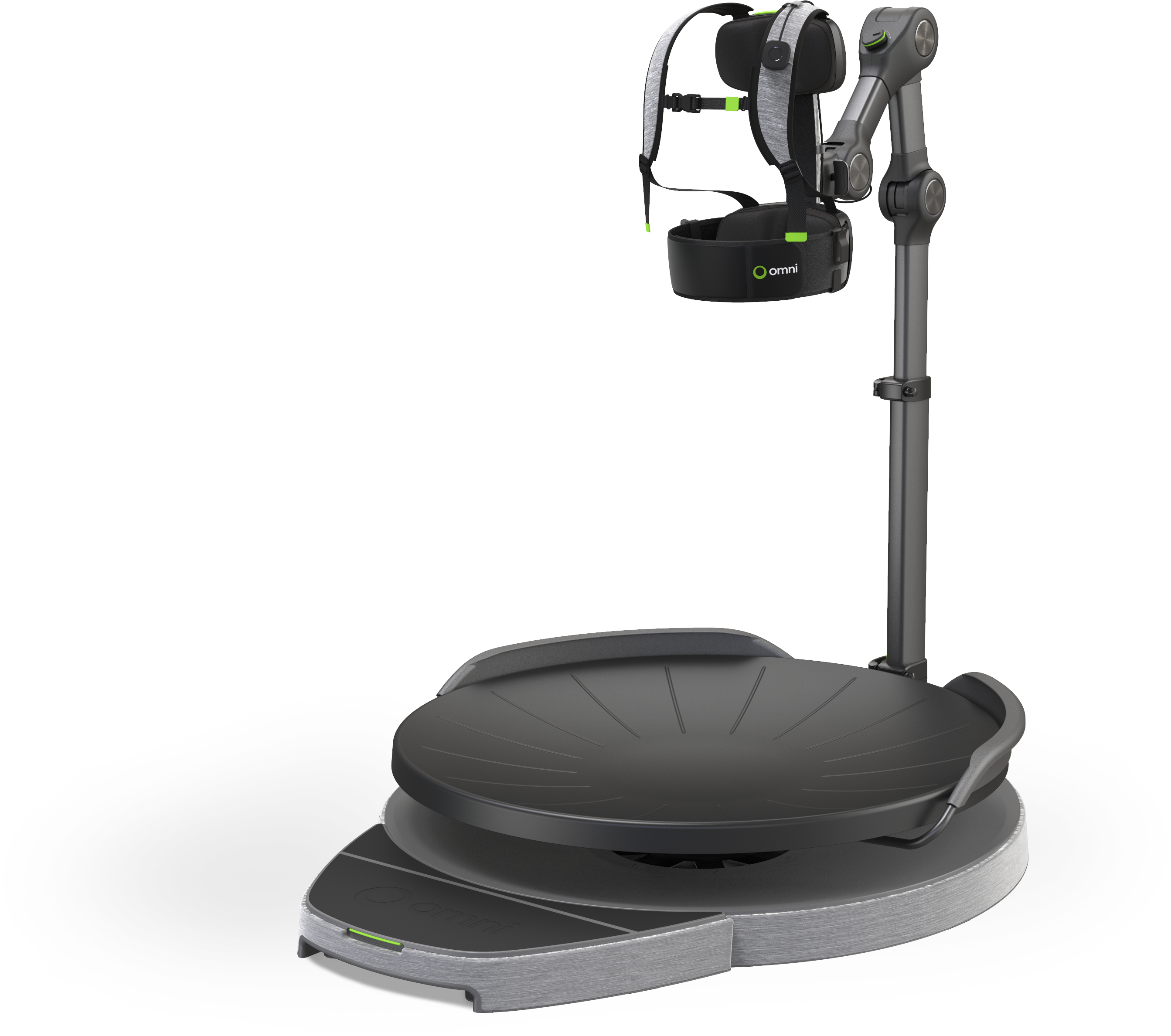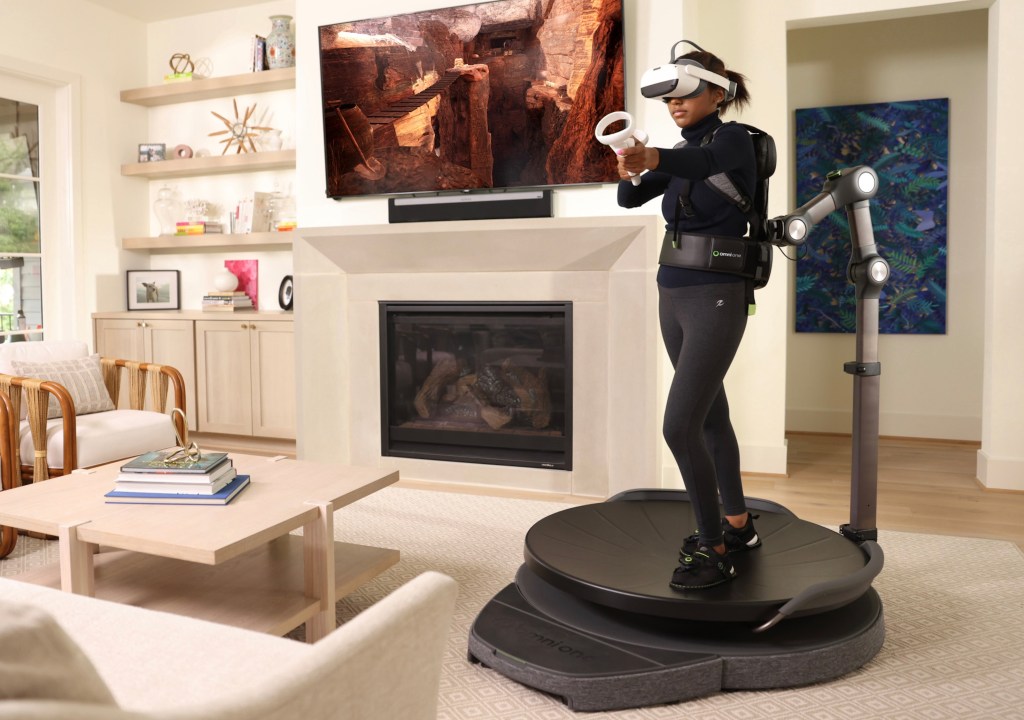As free promotion for hardware startups go, one would be hard pressed to point to something better than a $175 million Spielberg film.
“It was actually Warner Bros. that had reached out to us to get two Omnis for use in the movie,” Virtuix founder and CEO Jan Goetgeluk tells TechCrunch. “We shipped them two, and they were used as the model for the CGI in the movie.”
An omnidirectional treadmill features prominently in Ready Player One’s real-world segments — though the design is a notable departure from Virtuix’s Omni offering, owing in part to the fact that the film is set more than 20 years in the future. The fictional depiction of virtual reality and adjacent technologies are intentionally forward-looking.
Virtuix’s product is less mechanical than Spielberg’s take, which more closely resembles a standard treadmill. It instead relies on a concave design and slip-on shoe covers, using the effect of foot slipping to simulate movement in VR. Both versions do, however, rely on a tether to stabilize the user.
Early versions of the Austin, Texas hardware startup’s product were on writer Ernest Cline’s radar well before the film’s pre-production began. “Funnily enough, [he] lives in Austin,” says Goetgeluk. “As part of our Kickstarter campaign in 2013, one of the price tier perks was 50 Ready Player One books signed by Cline. And then we did a small event in Austin with Cline signing the books. We had a wooden prototype at the time.”
The company crossed my radar at roughly the same time. Virtuix gave me a demo of the product in a hotel room at E3 that year. Writing for Engadget, I noted:
I stood still for a moment with my hands out so the Kinect could find me, popped the Oculus over my head and went to town. It’s probably a bit hyperbolic to call the experience “fully immersive,” but man, it’s easy to get lost in the game — so long as you can forget that there are other people watching.
(That last bit continues to be a sticking point for me.)
Not long after, Virtuix blew past its modest $150,000 Kickstarter goal, with $1.1 million pledged, catapulting it into the crowdfunding service’s all-time Top 10 technology campaigns. A Shark Tank appearance proved less fruitful, though panelist Mark Cuban would later personally invest in the company. All told, the company has raised $35 million from investors over the past decade or so, with much of that arriving through the less traditional route of equity crowdfunding.
The company delivered a few hundred of the units to backers, but ultimately ran into a wall when it came to international pledges. “We actually refunded our Kickstarter backers all over the world with interest,” explains Goetgeluk. The move arrived as Virtuix shifted plans for its device. Given the size, price and nascent nature of the home VR market, the company began focusing its efforts on commercial clients, including arcades and arcade-adjacent venues like Dave & Busters. To date, Virtuix has sold around 70 of its Omni Arena models to U.S. arcades.
The move is especially interesting in light of the relatively recent shift toward enterprise customers that’s been explored by Meta, Magic Leap and HTC. Pretty much all of the big players, outside of Sony’s PSVR.
Late last month, the company announced that it was finally ready to begin shipping a home version of its treadmill, making good on its promise nearly a decade later. The Omni One features some upgrades to the original model (including a new tethering arm), but is essentially the same product. The price, meanwhile, is substantial, at $2,595. That’s due, in part, to the fact that while the original was compatible with HTC headsets, this one is only available bundled with a customized Pico Neo 3 headset.

“Forty-five percent of our customers do have a VR headset,” says Goetgeluk. The Omni One is a complete system, but it’s not a closed system. So you can hook it up to a PC and use a PC-based VR headset. But it does come with a headset because it’s a better user experience.” That does not, however, apply to Meta’s Quest headset, owing to what the executive refers to as its “closed system.”
While the growth curve hasn’t been as substantial as many had hoped, interest in VR has risen once again, owing to new products from Sony, Meta, HTC and Magic Leap. If Apple announces its own mixed reality headset later this year as expected, we can expect substantially more excitement around the category — even if it fails to live up to impossible expectations. Even so, a nearly $3,000 price tag is going to be difficult for most consumers to swallow.
Goetgeluk notes, however, that the road to profitability might not be that long after all, should the company manage to produce 3,000 units a month — something he insists is a realistic expectation.
“We have hundreds of thousands of players [including the commercial units], and without marketing, 35-40,000 people say they want one,” he says. “Once we start marketing, I think our customer acquisition cost initially will be very low, because our products go viral. We have these videos with over 30 million views. Elon Musk himself tweeted about our experience. It’s a really exciting product that tends to appeal to a lot of people. So, we’re confident that the demand is there.”
The Omni One is currently shipping to beta users, with a commercial version expected later this year. Who knows, maybe Musk will buy a few for his friends.































Comment